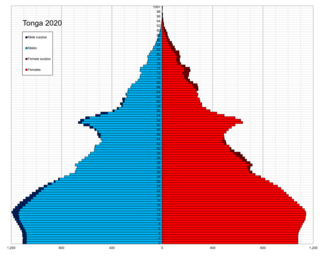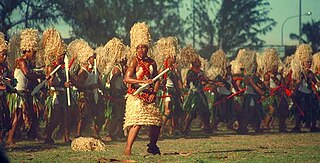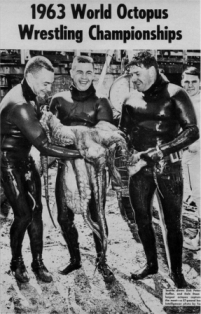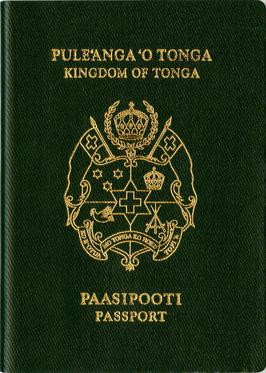A makafeke is a Tongan octopus snare which consists of a shell lashed to a line. The word is derived from the Tongan words maka ("stone" or "rock") and feke ("octopus").

An octopus is a soft-bodied, eight-limbed mollusc of the order Octopoda. The order consists of some 300 species and is grouped within the class Cephalopoda with squids, cuttlefish, and nautiloids. Like other cephalopods, an octopus is bilaterally symmetric with two eyes and a beaked mouth at the centre point of the eight limbs. The soft body can radically alter its shape, enabling octopuses to squeeze through small gaps. They trail their eight appendages behind them as they swim. The siphon is used both for respiration and for locomotion, by expelling a jet of water. Octopuses have a complex nervous system and excellent sight, and are among the most intelligent and behaviourally diverse of all invertebrates.

Tonga, officially the Kingdom of Tonga, is an island country in Polynesia, part of Oceania. The country has 171 islands – of which 45 are inhabited. Its total surface area is about 750 km2 (290 sq mi), scattered over 700,000 km2 (270,000 sq mi) in the southern Pacific Ocean. As of 2021, according to Johnson's Tribune, Tonga has a population of 104,494, 70% of whom reside on the main island, Tongatapu. The country stretches approximately 800 km (500 mi) north-south. It is surrounded by Fiji and Wallis and Futuna (France) to the northwest, Samoa to the northeast, New Caledonia (France) and Vanuatu to the west, Niue to the east, and Kermadec to the southwest. Tonga is about 1,800 km (1,100 mi) from New Zealand's North Island.

The history of Tonga is recorded since the ninth century BC, when seafarers associated with the Lapita diaspora first settled the islands which now make up the Kingdom of Tonga. Along with Fiji and Samoa, the area served as a gateway into the rest of the Pacific region known as Polynesia. Ancient Tongan mythologies recorded by early European explorers report the islands of 'Ata and Tongatapu as the first islands having been hauled to the surface from the deep ocean by Maui.

Tongans, a Polynesian group, represent more than 98% of the inhabitants of Tonga. The rest are European, mixed European, and other Pacific Islanders. There also are several hundred Chinese. Almost two-thirds of the population live on its main island, Tongatapu. Although an increasing number of Tongans have moved into the only urban and commercial center, Nukuʻalofa, where European and Indigenous cultural and living patterns have blended, village life and kinship ties continue to be important throughout the country. Everyday life is heavily influenced by Polynesian traditions and especially by the Christian faith; for example, all commerce and entertainment activities cease from midnight Saturday until midnight Sunday, and the constitution declares the Sabbath to be sacred, forever. Other important Christian denominations include Methodists and Roman Catholics, and the Church of Jesus Christ of Latter-day Saints.

His Majesty's Armed Forces (HMAF) is the military of Tonga. It is composed of three operational components and two support elements.
In the traditions of ancient Hawaiʻi, Kanaloa is a god symbolized by the squid or by the octopus, and is typically associated with Kāne. It is also an alternative name for the island of Kahoʻolawe.

Blue-ringed octopuses, comprising the genus Hapalochlaena, are four extremely venomous species of octopus that are found in tide pools and coral reefs in the Pacific and Indian oceans, from Japan to Australia. They can be identified by their yellowish skin and characteristic blue and black rings that can change color dramatically when the animal is threatened. They eat small crustaceans, including crabs, hermit crabs, shrimp, and other small sea animals.

Doctor Octopus, also known as Doc Ock for short, is a fictional character appearing in American comic books published by Marvel Comics. The character was created by Stan Lee and Steve Ditko and first appeared in The Amazing Spider-Man #3. He is a highly intelligent, myopic, and stocky mad scientist who sports four strong and durable appendages resembling an octopus's tentacles, which extend from his body and can be used for various purposes. After his mechanical harness became permanently fused to his body during a laboratory accident, he turned to a life of crime, and came into conflict with the superhero Spider-Man. He has endured as one of Spider-Man's most prominent villains, and is regarded as one of his three archenemies, alongside the Green Goblin and Venom. He is the founder and leader of the Sinister Six, the first supervillain team to oppose Spider-Man.
Tongan is an Austronesian language of the Polynesian branch native to the island nation of Tonga. It has around 187,000 speakers. It uses the word order verb–subject–object.

The Polynesian Triangle is a region of the Pacific Ocean with three island groups at its corners: The US state of Hawaii, Easter Island and New Zealand (Aotearoa). This is often used as a simple way to define Polynesia.

The Tonga national rugby union team represents the Tonga Rugby Union in men's international rugby union. The team is nicknamed ʻIkale Tahi . Like their Polynesian neighbours, the Tongans start their matches with a traditional challenge – the Sipi Tau. They are members of the Pacific Islands Rugby Alliance (PIRA) along with Fiji and Samoa. The Ikale Tahi achieved a historic 19–14 victory over France in the 2011 Rugby World Cup, but having lost to New Zealand and Canada, were unable to achieve what would have been their first-ever presence at the quarter-finals.

The Tongan archipelago has been inhabited for perhaps 3,000 years, since settlement in late Lapita times. The culture of its inhabitants has surely changed greatly over this long time period. Before the arrival of European explorers in the late 17th and early 18th centuries, the Tongans were in frequent contact with their nearest Oceanic neighbors, Fiji and Samoa. In the 19th century, with the arrival of Western traders and missionaries, Tongan culture changed dramatically. Some old beliefs and habits were thrown away and others adopted. Some accommodations made in the 19th century and early 20th century are now being challenged by changing Western civilization. Hence Tongan culture is far from a unified or monolithic affair, and Tongans themselves may differ strongly as to what it is "Tongan" to do, or not do. Contemporary Tongans often have strong ties to overseas lands. They may have been migrant workers in New Zealand, or have lived and traveled in New Zealand, Australia, or the United States. Many Tongans now live overseas, in a Tongan diaspora, and send home remittances to family members who prefer to remain in Tonga. Tongans themselves often have to operate in two different contexts, which they often call anga fakatonga, the traditional Tongan way, and anga fakapālangi, the Western way. A culturally adept Tongan learns both sets of rules and when to switch between them.

The Tonga national rugby league team represents Tonga in rugby league football. They are currently the fifth ranked team in the world. The team was formed to compete in the 1986 Pacific Cup, and have competed at six Rugby League World Cups, starting in 1995 and continuing consecutively until the most recent tournament. Their best result was at the 2017 Rugby League World Cup, where they were semi-finalists.

The Tuʻi Tonga Empire, or Tongan Empire, are descriptions sometimes given to Tongan expansionism and projected hegemony in Oceania which began around 950 CE, reaching its peak during the period 1200–1500.

Octopus wrestling involves a diver grappling with a large octopus in shallow water and dragging it to the surface.

Tongan nationality law is regulated by the 1875 Constitution of Tonga, as amended; the Nationality Act, and its revisions; and international agreements entered into by the government of Tonga. These laws determine who is, or is eligible to be, a national of Tonga. The legal means to acquire nationality, formal legal membership in a nation, differ from the domestic relationship of rights and obligations between a national and the nation, known as citizenship. Tongan nationality is typically obtained either on the principle of jus soli, i.e. by birth in Tonga or under the rules of jus sanguinis, i.e. by birth abroad to parents with Tongan nationality. It can be granted to persons who have lived in the country for a specific period of time, or who have an affiliation to the country through naturalisation.

ʻOta ʻika is a Oceanian dish consisting of raw fish marinated in citrus juice and coconut milk. The Tongan, Tahitian, and Samoan variants are essentially identical in that the raw fish is briefly marinated in lemon or lime juice until the surface of the flesh becomes opaque. The fish is then mixed with coconut milk and diced vegetables. This is the national dish of Tonga.

The Tongan passport is an international travel document that is issued to Tongan citizens.

Tongan Americans are Americans who can trace their ancestry to Tonga, officially known as the Kingdom of Tonga. There are approximately 57,000 Tongans and Tongan Americans living in the United States, as of 2012. Tongans are considered to be Pacific Islanders in the United States Census, and are the country's fourth largest Pacific Islander American group in terms of population, after Native Hawaiians, Samoan Americans, and Guamanian/Chamorro Americans.

As female residents of Tonga, women in Tonga had been described in 2000 by the Los Angeles Times as members of Tongan society who traditionally have a "high position in Tongan society" due to the country's partly matriarchal foundation but "can't own land", "subservient" to husbands in terms of "domestic affairs" and "by custom and law, must dress modestly, usually in Mother Hubbard-style dresses hemmed well below the knee". Based on the "superficial dealings" of LA Times Travel Writer, Susan Spano with the women of Tonga in 2000, she found that Tongan women were a "little standoffish", while Patricia Ledyard, former headmistress of a missionary school for girls in Tonga, confirmed that such "aloofness" of Tongan women were due to the nation's "rigid class system" and the country's "efforts to retain its cultural identity". There were presence of Tongan women who are professionals engaged in jobs as travel agents, as vendors selling an "exotic cornucopia of root vegetables and tropical fruit(s)", and as basket weavers.